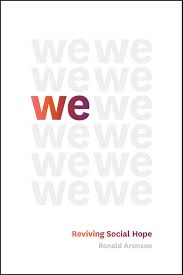Book review | We: Reviving Social Hope, by Ronald Aronson
In We: Reviving Social Hope, Ronald Aronson takes stock of the current state of US society, attributing the rise of Donald Trump to a steep decline in participatory democracy throughout the twentieth century and offering a blueprint for restoring hope to the body politic. This is an intellectually rigorous analysis, writes Jeff Roquen, that will contribute to a broader debate about how to reposition the pursuit of a ‘common good’ as the central aim of politics today.

Lift buttons in San Francisco. Photo: Jeremy Brooks via a CC-BY-NC 2.0 licence
We: Reviving Social Hope. Ronald Aronson. University of Chicago Press. 2017.
On 4 November 2008, nearly a quarter of a million people flocked to Grant Park in Chicago to watch Barack Obama accept his victory in the presidential election. After more than two centuries of slavery and another 150 years of racial exclusion, many in the audience openly wept with joy at the sight of the first African-American US President. To a worldwide television and radio audience consisting of tens of millions, President-Elect Obama announced:
This is our moment. This is our time […] to reclaim the American Dream and reaffirm that fundamental truth – that while we breathe, we hope, and where we are met with cynicism and doubt, and those who tell us that we can’t, we will respond with that timeless creed that sums up the spirit of a people: Yes, We Can.
After generations of struggle, sacrifice and ‘The Audacity of Hope’ undertaken by countless Americans against ignorance, intolerance and the politics of division, Barack Obama took the presidential oath of office on 20 January 2009. Seven years later, voters in the United States elected Donald Trump – an anti-liberal populist. What explains the abrupt and radical political departure?
In We: Reviving Social Hope, Ronald Aronson utilises the writings of Jean-Paul Sartre (1905-80) to explain the rise of Trump as a consequence of the steep decline of participatory democracy in the United States and offers a blueprint to restore hope to a seemingly enervated body politic.
During the Second World War, Sartre – a Parisian savant – joined several anti-fascist organisations and revamped the concept of existentialism in both a philosophical tome (Being and Nothingness, 1943) and in an accomplished novel (The Age of Reason, 1945). For existentialists, ‘[Humankind] is condemned to be free’ (Sartre), and truly authentic individuals accept that they alone create and re-create meaning in their lives by making self-conscious value judgements and rejecting the fate and inevitability contained in both ideological systems (i.e. fascism and communism) and religious dogma. As Sartrean existentialism provided a formidable methodological tool to sweep away oppressive traditions, delegitimise expedient behaviour and challenge the power of elites, it appealed to coteries of intellectuals under Nazi occupation in France, the Netherlands and elsewhere in Europe.
Only a few paragraphs into the opening essay of this book, ‘Hope in Trouble’, Aronson immediately identifies the expansion of near-unbridled capitalism into the realm of culture as the most corrosive force debilitating the once vaunted idea of ‘the common good’ as expressed by Obama and other politicians. Instead of a nation bound by shared aspirations (i.e. widespread prosperity, equal rights for women and minorities, measures to combat climate change and reasonable restrictions on gun ownership, etc.), the United States, according to the author, has devolved into a disunited assemblage of self-absorbed, acquisitive and career-focused individuals due to the permeation of ‘market logic and metrics […] in government, education, culture, and the law’ (9).
As a result of this ‘privatisation of hope’ – or the deterioration of hope in solving the problems of civil society by democratic means – the twenty-first-century temper of American life now pivots on a ‘crude, aggressive, and cynical’ form of individualism. Consequently, a wave of ‘seriality’ – a Sartrean term to describe apathy and disconnectedness among people – now reigns from New York City to Los Angeles (19, 22-23). Although many readers will challenge Aronson’s bleak assessment, the consistency and cogency of the core elements of his case deserve due consideration.
Over the course of the third, fourth and fifth chapters, Aronson also delivers a scathing critique of contemporary notions of ‘progress’ as being antithetical to human flourishing. Despite an impressive thirty-year increase in life expectancy (49 to 79 years from 1900-2016) and an unparallelled record of wealth creation from 1945-75 in the US, the author nevertheless attacks the modern idea of progress as a transmogrified, elitist-driven, capitalist enterprise bent on overdevelopment and maximising profits at the expense of both workers and the environment (80-81, 131-35).
Is Aronson correct? During the Great Recession (2008-12), the US middle class, which had already endured a 35-year drought in wage gains, contracted significantly. While the economy has rebounded to some degree, many workers, who still face working longer hours and paying higher premiums for health insurance than the previous generation, lack the financial means to purchase big ticket items (home and cars) or save for retirement. Partly as a result of corporate influence on politics, the richest one per cent now control ‘more than 20% of all U.S. income’, and the steady transfer of wealth from the middle classes to the upper classes since the 1980s has led to a surge in the numbers of working poor and impoverished. In respect to the environment, the decision of the Trump administration to withdraw from the Paris Climate Agreement in 2017 may prove to be a watershed moment in history. Due to the failure to rein in manufacturers from the excessive production of greenhouse gases and continued denial of the scientifically proven impact of human activity on climate change, warmer temperatures, declining sea levels, decreased crop production, less potable water and more episodes of extreme weather will invariably cause mass dislocations and global distress in the near and long-term future.
How and why, then, can individuals break their seriality and revive a sense of hope? In Chapter Two, ‘What Hope Is’, Aronson employs one of Sartre’s famous anecdotes from his later and somewhat controversial Critique of Dialectical Reason (1960). At a bus stop, commuters sit or stand in silence and remain in their private worlds. What would occur, however, if the bus failed to arrive after a considerable length of time? Most likely, a dialogue would begin among several (if not all) of the previously isolated individuals to determine whether to continue waiting or to locate other means of transportation. In defining hope as a collective group (or a ‘We’) resolving to alter the status quo for the betterment of all, Aronson squarely links hope to a leftist-progressive project to overcome socio-economic inequality through solidarity. Hence, Occupy Wall Street, the Arab Spring as well as campaigns for equal marriage and against sexual harassment all constitute genuine expressions of hope – as hope requires action for the ‘common good’ (48-59).
In Chapter Six, ‘We’, Aronson furthermore lauds the presidential campaign of Democratic Socialist Bernie Sanders as evidence of the resilience of hope. By mobilising the latent idealism of millions of young people around policies anchored in the ‘common good’ (i.e. universal health care, tuition-free college education and the public financing of elections to remove the corrupting influence of corporate donations), the progressive movement behind Senator Sanders stands as a potent, countervailing force to the ‘anti-hope’ political currents of ‘Trumpism’ (176).
If conservative and mainstream critics simply dismiss We: Reviving Social Hope as an outdated, leftist screed, their evaluation will be at least partly mistaken. Through an intellectually rigorous analysis, Aronson has contributed to our understanding of modern America by illuminating how social and economic cynicism generates disillusionment and seriality (passive silence) across the political spectrum. At the same time, his investigation yields tangible insights into the decline of empathy in the United States over the past few decades.
To create a more just and socially responsible country, it will be necessary for Americans to once again embrace the virtues of hope, civility, citizenship and persistence for the benefit of both the United States and the entire world. As such, We: Reviving Social Hope will hopefully be only one of a number of forthcoming critical monographs seeking to stir a robust debate on how America can rediscover its raison d’être as ‘We The People’ and re-establish ‘the common good’ as both a means to and an end of politics.
This post represents the views of the author and not those of Democratic Audit. It first appeared at the LSE Review of Books.
Jeff Roquen is an independent scholar based in the United States.

 Find this book:
Find this book: 



 Democratic Audit's core funding is provided by the Joseph Rowntree Charitable Trust. Additional funding is provided by the London School of Economics.
Democratic Audit's core funding is provided by the Joseph Rowntree Charitable Trust. Additional funding is provided by the London School of Economics.